If you have ever spent time digging through emails to find one contract or worried about missing a renewal date, you know how stressful contract management can get. For legal practitioners, legal contract management software should be your secret weapon. This software takes the chaos and turns it into an organized process. Instead of sorting through piles of paper or messy shared folders, you store everything in one secure, searchable place.
Finding a contract or a specific clause now takes seconds, not hours. Plus, many tools offer ready-to-use templates and automation features. This means drafting a new agreement is as simple as a quick edit and send, rather than starting from scratch. No more passing around multiple versions through endless email threads. Instead, everyone works on the same document and sees updates as they happen.
You can also set automatic reminders for renewals, deadlines, and compliance tasks. As a result, nothing important slips through the cracks. In addition, built-in compliance checks and audit trails give you peace of mind. Every contract meets legal standards and carries a clear record of edits and approvals.
This article reviews 13 leading legal contract management software solutions. It looks at how well each one meets the strict demands of modern legal practice.
Top 13 Best Legal Contract Management Software
1. Ironclad
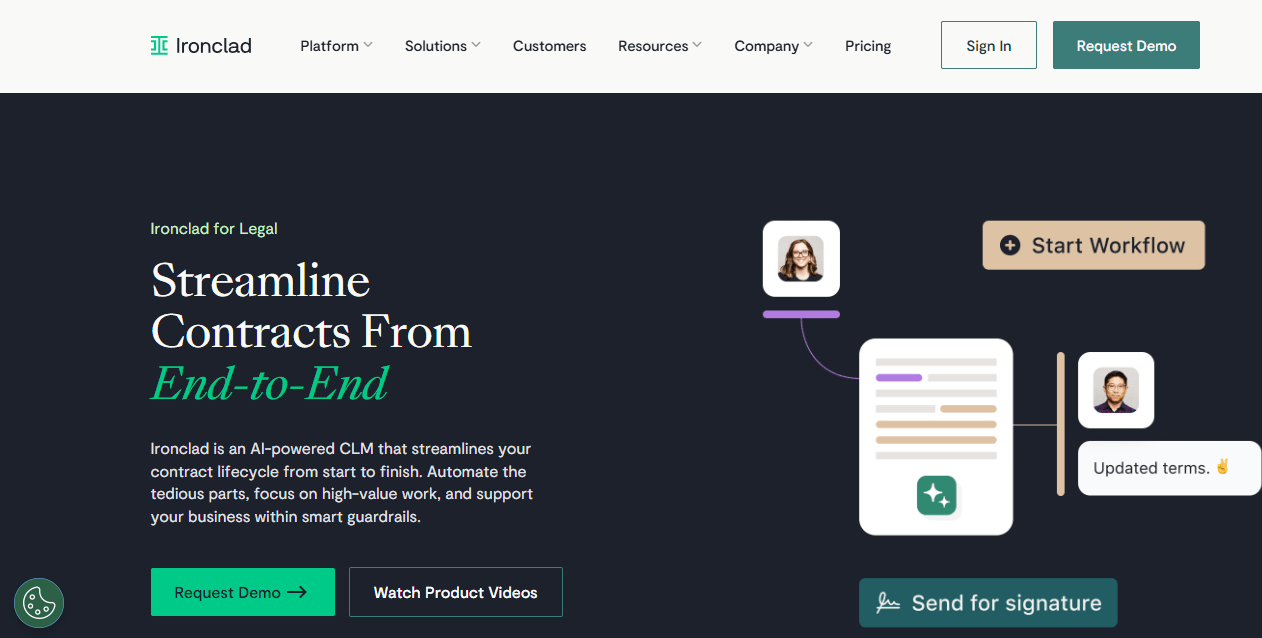
Ironclad is a leading contract management software provider that helps businesses take control of their legal operations. This cloud-based platform enables in-house legal teams to manage the entire contract lifecycle from creation and approvals to compliance and reporting within one secure system. By simplifying contract processes, Ironclad frees legal professionals to focus on strategic initiatives instead of repetitive administrative work.
A standout feature is Ironclad Jurist, its AI-powered legal assistant. Jurist uses advanced technology to help lawyers review contracts faster, reduce manual tasks, and make data-driven decisions that protect the business and reduce risk.
Features
- Legal workflow designer: Build approval workflows, escalation rules, and deadline trackers with a simple drag-and-drop interface, no IT help required.
- Contract repository: Store every contract securely in a centralized location, making it easy to search, retrieve, and reference past agreements.
- Audit trail: Maintain a clear record of every action taken during the contract process, supporting compliance and accountability.
- Risk scoring algorithm: Automatically evaluate contracts for risk, highlight problem clauses, and suggest ways to mitigate potential issues.
Pros
- Optimized for legal teams: Purpose-built to address the most common challenges faced by in-house counsel and legal operations teams.
- Enhanced collaboration: Improves communication between legal and business stakeholders, cutting down email chains and speeding up approvals.
- Customizable risk management: Flexible tools let teams adjust risk assessment criteria to match their practice areas and risk tolerance.
Cons
- Tracking contract renewals within the platform can be challenging.
- Performance may slow down when handling large volumes of contracts at once.
- Lack of Slack integration limits real-time collaboration options for some teams.
Pricing
Contact to get custom pricing.
Best For
In-house legal departments seeking to improve business collaboration and legal operations teams.
2. ContractWorks
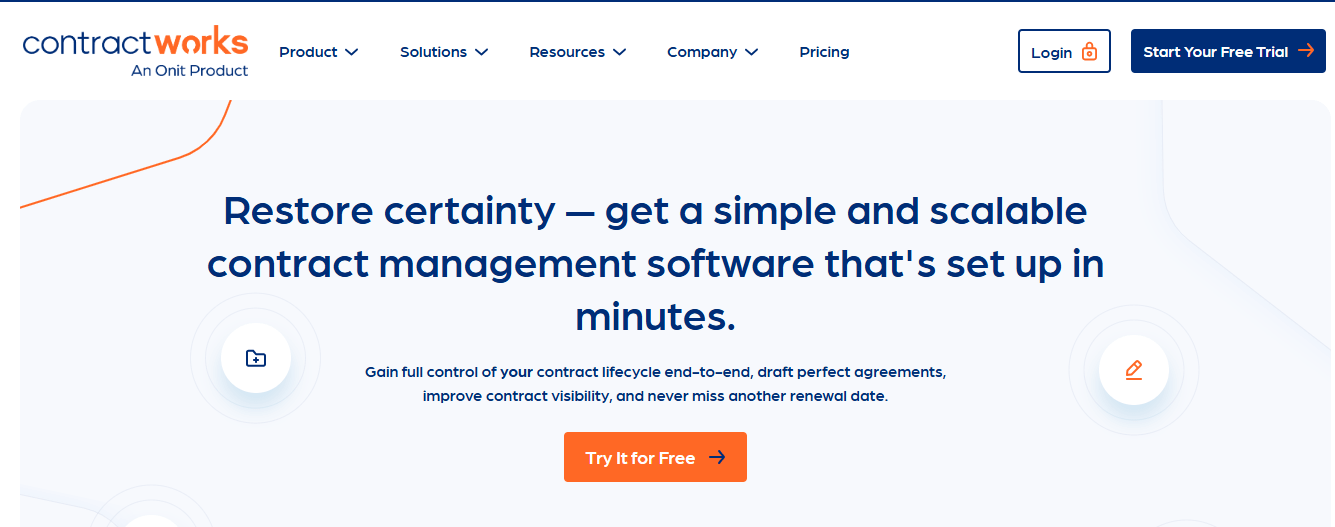
ContractWorks helps businesses execute, store, and track contracts with ease. Its quick setup and user-friendly interface make contract management accessible to teams of any size. In addition to its contract management tools, ContractWorks provides dedicated support professionals to help businesses manage their entire contract portfolio. It simplifies every stage of the contract lifecycle from drafting to renewal while maintaining compliance and security.
Features
- Secure Contract Repository: Store all contracts in a searchable, SOC 2 Type 2–compliant repository.
- Custom Reporting: Create tailored, scheduled reports to monitor key contract metrics.
- OCR & Advanced Search: Locate contract details instantly using optical character recognition and robust search tools.
- Electronic Signature: Send, sign, and store documents from anywhere with built-in e-signature functionality.
Pros
- Organizes contracts effectively with easy folder creation, user-specific permission settings, and security layers.
- Saves time with digital signature capabilities, eliminating the need for printing and mailing documents.
Cons
- Some clients experience issues with the digital signature feature not supporting stamp-based signatures.
- Occasional problems with automatic workflows misrouting contracts to the wrong recipients.
Pricing
- Starts at $700 per month.
Best For
Small to medium-sized law firms, solo practitioners, and legal departments prioritizing simplicity and quick implementation.
3. Agiloft

Agiloft’s flagship contract lifecycle management suite runs on a no-code platform and gives legal teams full control over buy- and sell-side contract management. The platform includes a centralized contract repository, reusable templates, a clause library, flexible approval workflows, built-in AI, security and compliance safeguards, automated notifications, and integrations with existing systems. Legal teams configure and customize workflows to match their practice requirements. The no-code setup lets professionals create and apply complex business rules without needing technical expertise.
Features
- Unlimited customization: Legal teams build complex approval hierarchies, matter-specific processes, and jurisdiction-specific requirements.
- Advanced reporting engine: Analytics support legal operations, compliance reporting, and risk management.
- Multi-Language support: International teams manage contracts in multiple languages with built-in localization tools.
- Complex approval workflows: Routing tools manage multi-party approvals, conditional logic, and exception handling.
Pros
- Handles highly complex contract management challenges
- Offers deep customization and automation options
- Holds multiple security certifications, including SOC 2 Type 2
Cons
- Not ideal for smaller businesses with simple contract management needs
Pricing
Custom pricing.
Best For
Large legal departments with complex requirements, international law firms, and organizations requiring extensive customization capabilities.
4. PandaDoc
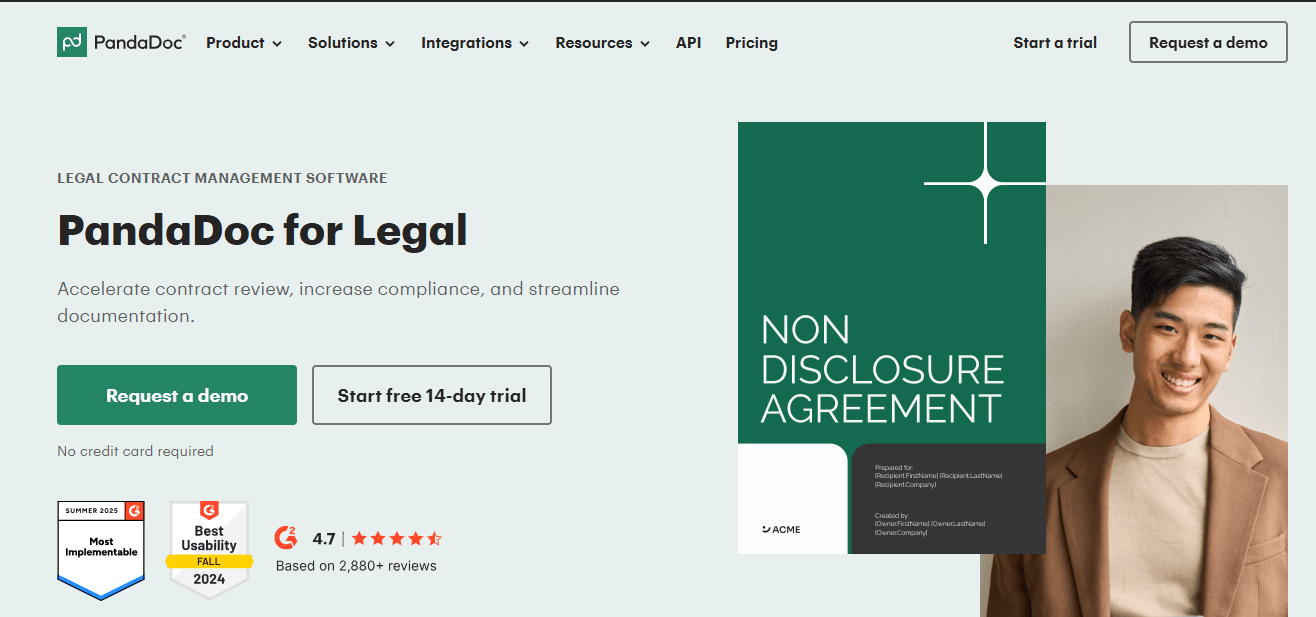
PandaDoc is a document automation software-as-a-service that helps teams create, send, and manage quotes, proposals, contracts, and other sales documents. It includes built-in electronic signatures, workflow management, and a document builder. PandaDoc uses enterprise-grade security to protect sensitive data, complying with standards like GDPR, FERPA, HIPAA, and SOC 2 Type II. With AES-256 data encryption, it secures documents against unauthorized access and maintains compliance throughout every transaction.
Features
- Document Automation: Use the advanced template engine with conditional logic to assemble complex legal documents accurately.
- Approval Workflows: Set up customizable approval steps to ensure the right legal review and sign-off process.
- E-Signature Integration: Sign contracts electronically with authentication options that meet legal standards.
- Analytics Dashboard: Track contract performance and spot process bottlenecks with actionable metrics.
Pros
- All-in-One Platform: Offers document creation, management, and execution in one place.
- Easy to Use: Intuitive interface reduces the learning curve and speeds up adoption.
- Mobile Support: Enables legal teams to work effectively while remote or traveling.
Cons
- No Offline Access: Most features require internet access, which can limit use in offline environments.
Pricing
- Essentials: $19 per user/month
- Business: $49 per user/month
- Enterprise: Custom pricing available
Best For
PandaDoc works well for small legal teams who want efficient document automation without the complexity or cost of specialized legal software. It helps manage contracts, NDAs, and other legal agreements with ease.
5. Concord
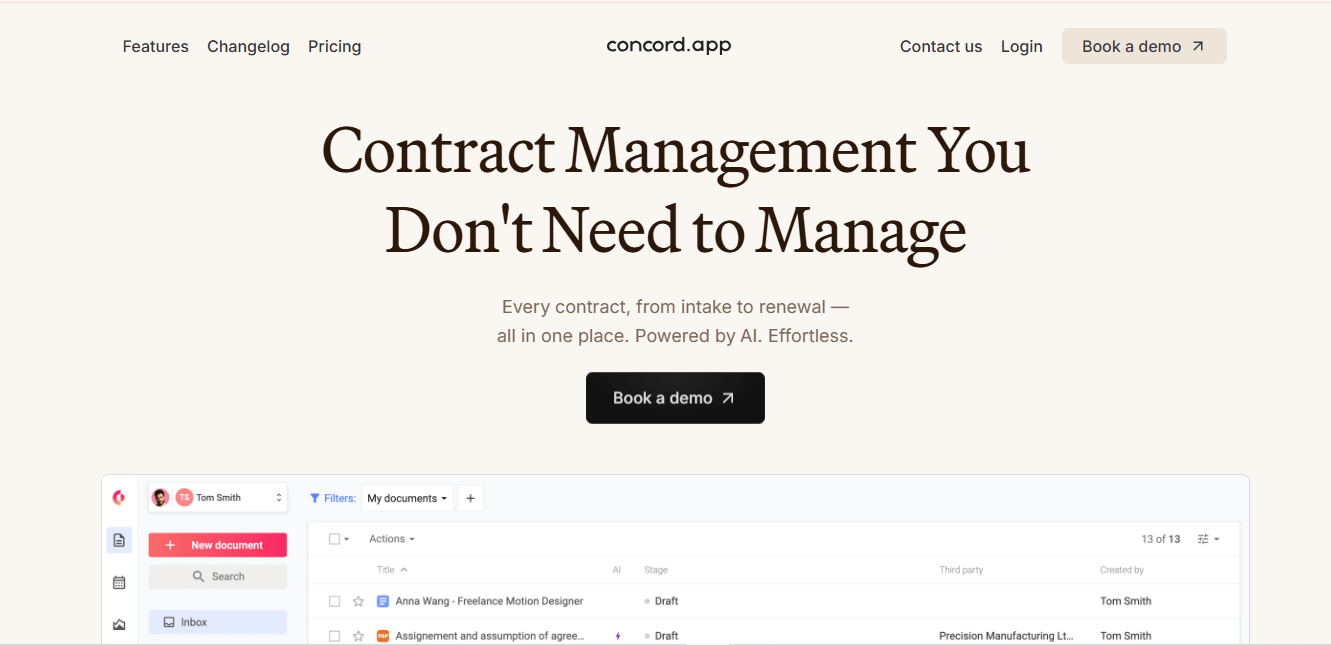
Concord offers a complete contract lifecycle management solution that allows users to create, collaborate, negotiate, e-sign, and manage agreements in one platform. Legal teams can adopt it easily, while other departments quickly adapt to its workflows. Concord centralizes documents, reduces time to signature, and strengthens compliance. Users draft contracts from templates, negotiate directly in the browser (eliminating email attachments), and receive AI-powered reviews in just 23 seconds. After signing, automated alerts track renewals and obligations. Concord also integrates with Salesforce, HubSpot, and accounting systems to prevent duplicate data entry.
Features
- Real-Time Collaboration: Comment and edit contracts simultaneously with full version control and audit trails.
- Modern Interface: Clean design encourages adoption and reduces training time for legal and business users.
- Version Control: Track every change accurately to support legal review and maintain compliance.
- Integration Capabilities: Connect with Salesforce, HubSpot, and accounting tools to maintain consistent data across systems.
Pros
- Easy-to-use pre-signature tools
- Ready-to-use templates for fast contract creation
- Powerful in-browser editing and negotiation tools
Cons
- Weak repository and contract management capabilities
- Document formatting can change when uploaded
- Setting up user access may take time.
Pricing
- Essentials: $399/month
- Business: $699/month
Best For
Legal teams focused on collaboration, mid-sized legal departments, and organizations that prioritize ease of use and smooth adoption across multiple teams.
6. Outlaw
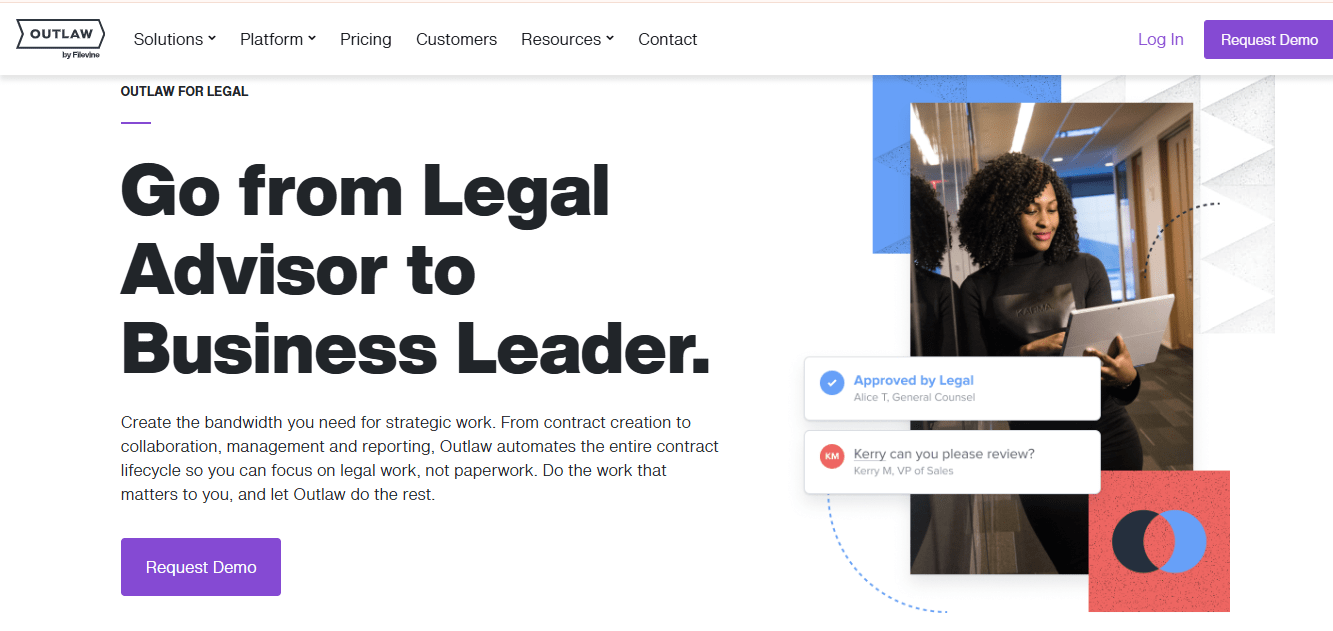
Outlaw is a modern contract management platform designed to simplify the entire contract lifecycle. It allows users to generate templated documents, collaborate in real time, redline contracts in the cloud, and collect e-signatures. In addition, the platform ingests buy-side contracts including redlines so all parties stay aligned. As a result, teams can track, store, and manage documents in its intelligent contract repository while maintaining visibility and compliance.
Features
- The word processor–style interface is intuitive and easy to adopt, which helps legal and business teams work more efficiently.
- Template Management: The flexible template system promotes consistency, while also allowing customization for specific agreements.
- Integration Capabilities: The platform connects with popular business applications, which in turn supports smooth and efficient workflows.
Pros
- Users appreciate that they can quickly send NDAs, employment contracts, and contractor agreements. In addition, the terms are presented in clear, plain English, which makes them easy for all parties to understand.
- Reviewers frequently highlight the editing and redlining tools, as these features make collaboration straightforward and efficient.
Cons
- However, some users note that Outlaw is less intuitive when handling court-related documents compared to standard contracts.
Pricing
- Contact Outlaw directly for pricing information.
Best for
Overall, Outlaw works best for legal and business teams that want a simple, collaborative way to manage contracts from creation to execution.
7. Linksquare
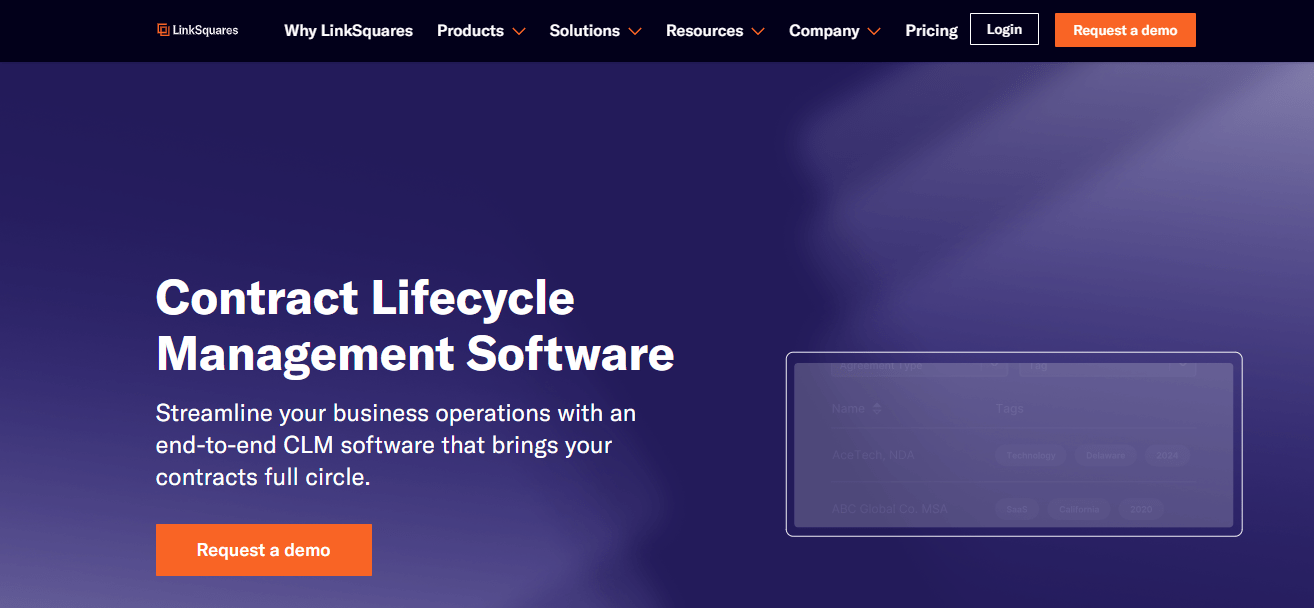
LinkSquares offers an AI-powered contract management platform designed for legal teams that want to work faster and smarter. It helps users create better contracts, execute agreements quickly, analyze existing contracts in depth, and collaborate with their teams at every stage of the contract lifecycle. The platform stands out for its AI-driven insights, rapid results through flexible automation, and centralized system that improves visibility and teamwork.
Features
- Uses predictive and generative AI built specifically for legal documents.
- Extracts clauses and obligations, suggests redlines, generates insights, and produces summaries.
- Offers customizable templates to standardize contract creation and reduce the need for drafting from scratch.
Pros
- Quickly locates relevant contracts, clauses, and metadata.
- Strong AI capabilities for post-signature analysis.
- Intuitive interface that makes daily tasks easy to complete.
Cons
- AI and data extraction are not perfect: users may need to verify metadata and correct errors for critical fields such as start dates or unusual clauses.
Pricing
- Contact LinkSquares for pricing details.
Best For
In-house legal teams that need a single platform to create, review, and manage contracts efficiently.
8. BlackBoiler
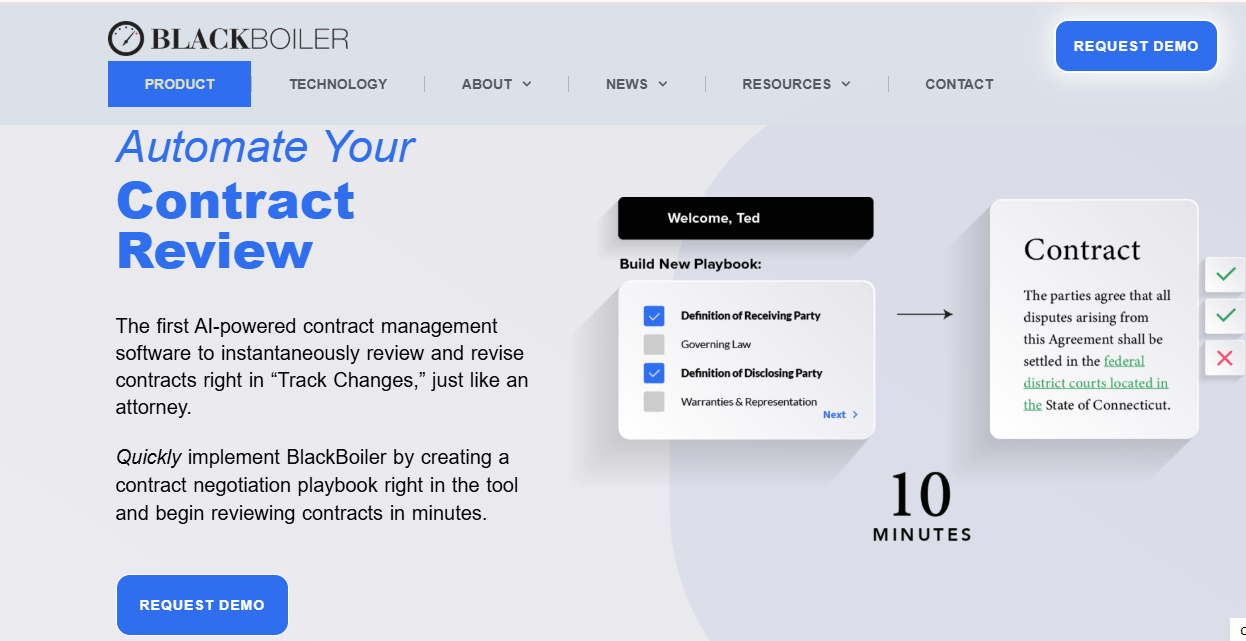
BlackBoiler builds contract-efficiency tools for companies, law firms, and legal service providers. Its AI-Assisted Contract Review uses proprietary deep learning and natural language processing to review and revise contracts instantly in Track Changes, just as an attorney would. The system draws on past contract reviews to speed up redlining of incoming documents.
Features
- The system uses AI, NLP, and machine-learning to review contracts and suggest edits automatically.
- Self-service playbooks: you can build your own playbook and use a clause library to get fast results at lower cost.
- Microsoft Word plugin: you draft and review agreements in Word with tracked changes and extra context.
- Custom playbook: you define your legal team’s bespoke rules, and the system redlines according to that.
- Data privacy: the tool keeps your data private and uses it only for your own rules or models.
Pros
- It saves users a lot of time during contract review.
- It increases consistency and standardization, because edits follow your playbooks.
Cons
- It may struggle with very complex clauses, unusual negotiated exceptions, or highly industry-specific bespoke contracts; in those cases you’ll likely need manual review.
Pricing
Pricing information isn’t publicly available; you must request pricing.
Best For
- In-house legal teams that handle large volume of standard or semi-standard contracts and want to reduce review time significantly.
- Organizations that already have a corpus of their negotiated contracts and clear preferences for how they want contracts to be modified, so the system can learn from historical data.
9. ContractSafe
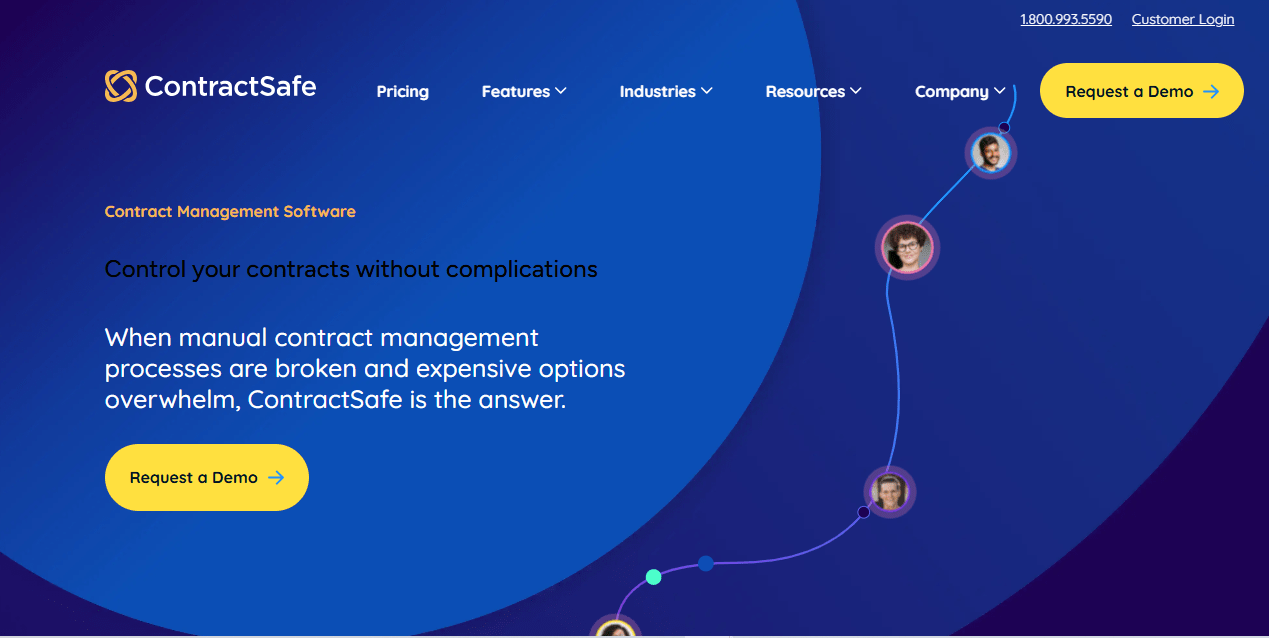
ContractSafe offers an AI-powered contract management platform that guides you through the whole contract lifecycle from creating contracts through executing them. It features a clean, intuitive interface. It speeds up contract reviews, improves accuracy, and keeps your contracts better organized.
Features
- Data extraction: ContractSafe’s AI assistant pulls out key information (e.g. important dates, payment terms, parties) so you don’t have to search manually.
- Organization and categorization: You can sort contracts by type (NDAs, sales agreements, etc.), by department, or by your own criteria, so you always find the right contract quickly.
- Automated workflows: The platform issues reminders and manages approvals to keep contract processes moving and reduce delays.
Pros
- Provides a hassle-free purchase path: free trial, demo, and no hidden fees.
- Offers powerful search capabilities.
- Manages dates fully and issues alerts to avoid missed deadlines.
- Includes strong support and training resources.
- Supports intake forms, contract templates, version control, and approval workflows.
Cons
- It doesn’t include in-app contract drafting or detailed editing; simple templates cover only basic creation.
- It lacks a clause library.
- Pricing may run high for smaller organizations or those with very simple contract needs.
- Some e-signature features/licensing may be limited depending on plan.
Pricing
- Organize: $375/month
- Finalize: $579/month
- Maximize: $746/month
Best For
- Small to mid-sized businesses and legal teams that need a contract repository, reminders, organization, and approval workflows without heavy complexity
10. Summize
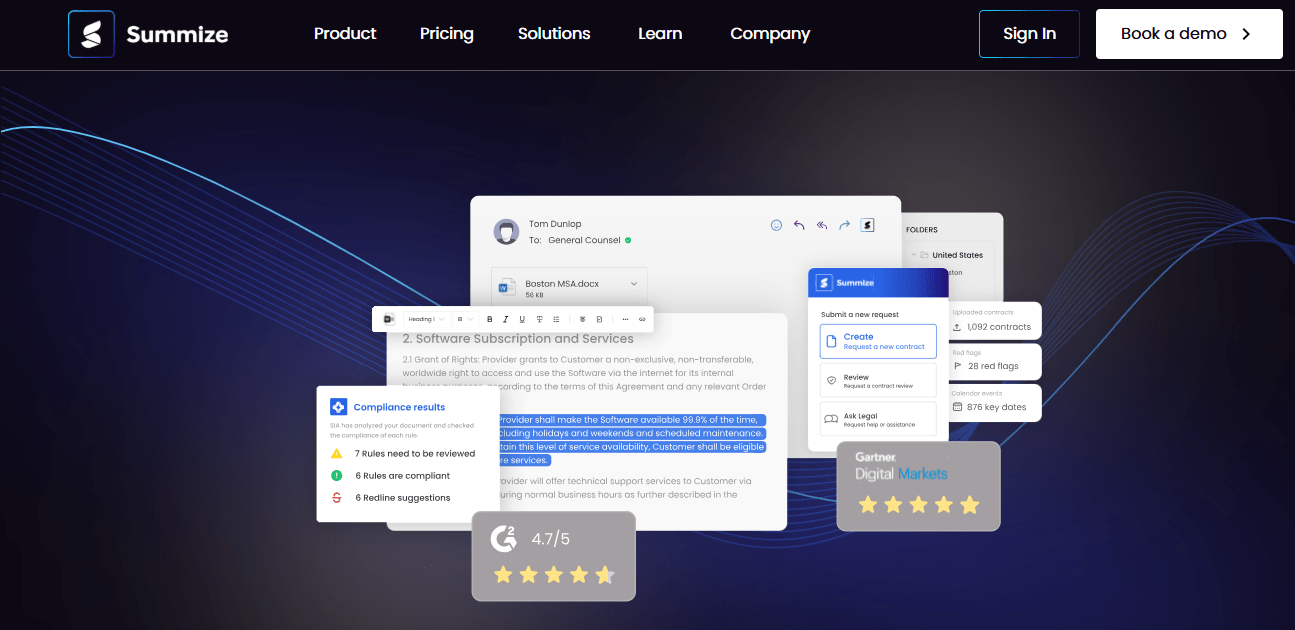
Summize serves companies that manage large, complex contract portfolios, including in sectors like legal services and regulated industries. It delivers via the cloud so users can access it from anywhere and scale their usage without installing heavy on-site infrastructure. Summize supports the full contract lifecycle: you draft contracts, negotiate terms, track obligations and renewals, store all documents centrally, use AI to analyze risks, and generate real-time reports so you can make better decisions.
Features
- Contract Repository: Summize gives you a secure, centralized and searchable place to store all contract documents, with version control
- AI-Powered Contract Analysis: Summize applies natural language processing and machine learning to pull out key data from contracts, highlight risk areas, and suggest insights.
- Reporting and Analytics: The software generates real-time dashboards and reports that show contract performance, compliance status, risk exposure and trends.
Pros
- It produces plain-language summaries of contracts and clauses, which helps non-legal users understand terms quickly.
- It identifies risk areas automatically, so legal teams can focus attention where it matters.
- Legal experts review and refine the AI outputs, which improves accuracy and trustworthiness.
Cons
Uploading large volumes of legacy contracts can take time and require manual correction to ensure consistency.
Pricing
Contact for quote.
Best For
Companies seeking to reduce contract review and negotiation time, especially when legal teams are overloaded.
11. Conga
Conga CLM helps you manage your contracts from creation through negotiation, approval, execution, and beyond. It boosts visibility into your contracting process, reduces risk, accelerates cycle times, and improves both user and customer experiences. Conga CLM supports you in creating complex agreements without errors and automating tasks such as authoring, negotiation, approvals, and reporting.
Features
- Contract creation & alerts: You can generate new contract profiles and set up notifications for every stage in the contract lifecycle.
- Smart central repository: You will store, locate, and search contracts in one place; AI extracts metadata for you.
- Negotiation portal: You can invite stakeholders to negotiate and collaborate on contracts.
- Reporting: You gain advanced data visualizations and detailed insights into how your contracts perform.
Pros
- You can integrate Conga Contracts easily with external systems like Salesforce.
- The sync between reference document or asset changes and contracts helps you avoid inconsistencies.
- Approval workflows keep approvers accountable and reduce bottlenecks.
Cons
Users must overcome a steep learning curve when you adopt the system.
The system lacks a way to track detailed changes within contracts, which can limit accountability.
Best for
Companies with large contract volumes and complex contracting needs.
12. DocJuris
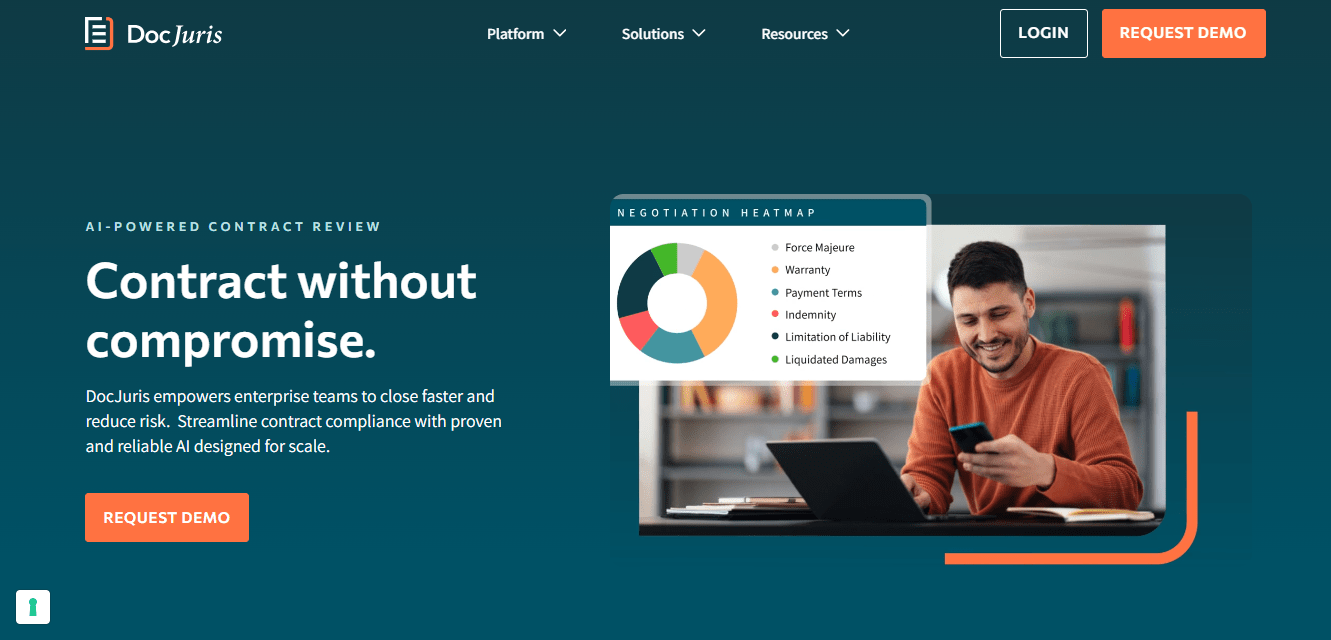
DocJuris is a contract management software built for contract negotiation. It highlights deviations from playbooks, supports collaboration across procurement, finance, and legal teams, and focuses on structured negotiation workflows rather than automated redlining.
Features
- Close deals faster: Users can pre-screen and negotiate contracts in alignment with playbooks and precedent, which helps shorten review and negotiation cycles.
- Contract data insights: Users gain analytics that reveal bottlenecks and opportunities for improvement in the review process, enabling better decision-making.
- Collaborative authoring: Users can edit and comment on contracts with colleagues and stakeholders to ensure consistent and accurate language.
Pros
- Speeds up review and negotiation cycles.
- Improves consistency and reduces risk across contracts.
- Empowers non-legal staff to handle routine contracts using playbooks and approved templates, freeing up the legal team for more complex work.
Cons
- Some users report minor usability issues.
- Pricing may be a concern for smaller teams.
Pricing
Requires direct contact for pricing details.
Best For
DocJuris works best for legal, procurement, and finance teams that handle frequent contract negotiations and need structured workflows to maintain consistency.
13. Docusign
DocuSign helps legal departments manage the entire agreement lifecycle from start to finish. First, it equips legal teams with tools to automate contract creation. Then, it applies AI and analytics to reduce risk. In addition, it keeps contracts in a secure, centralized repository with full audit trails. Legal teams can collaborate and connect the platform with their existing systems. As a result, DocuSign eliminates manual delays, gives lawyers better visibility into contract status, and frees them to focus on strategic work rather than administrative tasks.
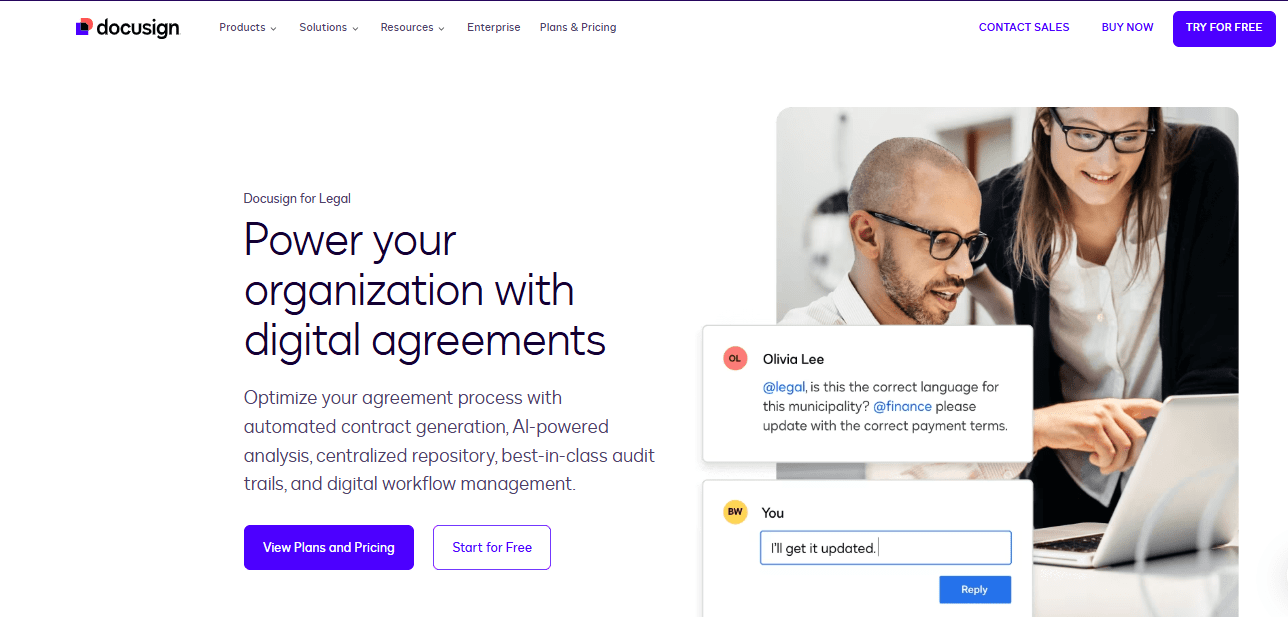
Features
- Centralized Intelligent Repository: Store all agreements in one secure, searchable location, making them easy to find and organize.
- Automated Templates and Agreement Generation: Create contracts faster using pre-built templates and one-click generation.
- AI-Powered Search, Summarization, and Analytics: Extract key terms, summarize important clauses, and identify missed revenue opportunities or unfavorable renewal terms.
- Collaboration Tools : Use drag-and-drop workflows, routing deviation tracking, inline comments, alerts, and shared collaboration spaces to review and approve contracts.
Pros
- Provides secure digital audit trails and meets compliance standards including ISO 27001, SOC 2 Type II, WCAG 2.0 Level AA, and GDPR.
- Supports multiple identity verification methods to ensure recipient authentication.
- Allows routing documents for internal or client reviews with real-time notifications about comments.
- Saves time by standardizing documents through reusable templates with customizable fields and automated workflows.
Cons
- Requires initial setup, configuration, and possible training to use AI, templates, and workflows effectively.
- Organizations may need to invest effort in configuring the system to match their specific processes.
Pricing
Personal – $10/month
Standard – $25/month per user
Business Pro – $40/month per user.
Best For
- Legal teams and law firms that want to manage contracts efficiently from creation to execution.
- In-house counsel looking for secure storage, audit trails, and real-time collaboration with business teams.
Choosing the right contract lifecycle management software is a critical step for legal professionals. To begin with, the software must fully support their professional duties and compliance obligations. In addition, it needs to fit within budget limits to remain financially practical. Therefore, legal professionals must carefully balance advanced software features with ethical responsibilities, cost considerations, and rollout concerns to make a well-informed decision.

